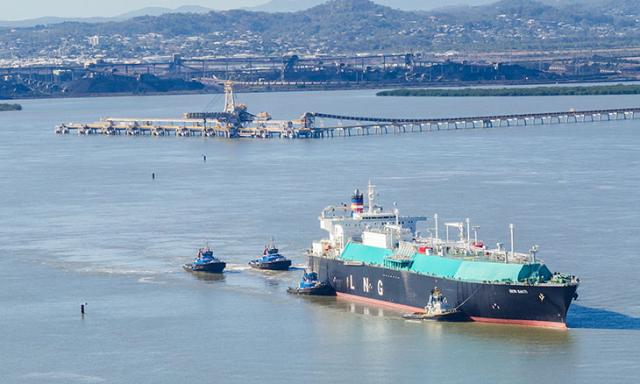
An LNG tanker sails from the GLNG plant on Curtis Island. (Source: Santos)
A persistently sluggish oil price recovery is having a detrimental effect on a much-needed gas investment boom in the eastern states of Australia, despite a looming energy crisis in a region where gas prices have doubled in the past year.
This was the surprise finding of a new report by independent energy consultancy EnergyQuest, which revealed that total east coast domestic gas demand fell by a modest 2.5% in the first quarter of 2017 compared to the same period in 2016.
EnergyQuest’s June quarterly review found that underlying gas demand is falling much faster in the face of prices spiking to an average of $9.95/GJ in the first quarter of this year. Excluding gas-use for power generation, gas use fell by 8%. When gas used to fuel Queensland LNG plants is excluded, the fall in gas-use was a staggering 16%, the report said.
“Average prices close to $10/GJ are clearly hitting demand,” said EnergyQuest CEO Graeme Bethune. “Paradoxically, high gas prices are not translating into a gas investment boom. Instead, the east coast is experiencing a drought of investment in domestic gas and a major reason is the fall in the oil price.”
Blackouts in South Australia late last year alerted the federal government to a predicted energy crisis in the eastern states within 12 to 18 months that has been red-flagged as a threat to manufacturing, jobs and the Australian economy.
However, Bethune appears to have adopted a barrel half-empty outlook towards critical gas investment, which industry executives say is non-negotiable to averting the midnight hour.
“After the (crude oil) price rallying to around US$55/bbl following the OPEC meeting in November last year, the price is now softening in the face of rising U.S. production. Australian gas development is likely to remain constrained by a sustained low oil price,” he said. “As a result, there is a risk that the problems on the east coast are long-term, not short-term.”
Bethune also said there are significantly undeveloped gas resources in the Cooper Basin and New South Wales, but development of the former is constrained by the low oil price and the latter by a ‘lock the gate’ (anti-gas campaign).”
Bethune welcomed federal government initiatives aimed at stimulating activity on the east coast and said Prime Minister Malcolm Turnbull’s direct involvement appeared to be “having positive results with some producers.”
“However, there appears to be a view that the LNG projects (specifically the three new Queensland plants on Curtis Island) are sucking vast volumes of gas from the domestic market and all would be well if this is stopped. This view is incorrect for two reasons,” Bethune said.
“Firstly, the sale of Santos Cooper Basin gas to GLNG was all signed-off in 2010, nearly seven years ago, without any obvious government concerns. The horse has well and truly bolted so far as that gas goes.
“Secondly, a substantial volume of other third-party gas contracted to the Santos-operated GLNG project appears to originate from other LNG projects and was never developed for domestic gas. Gas bought from third parties is not necessarily taking gas from the domestic market.
“Overall, it is likely that the net draw of the new east coast LNG terminals on domestic gas supplies is quite modest.”
Recommended Reading
Oil Prices Fall as Investors Take Stock of Biden Exit, Rate Cuts in Focus
2024-07-22 - Oil prices fell on July 22 after Joe Biden announced he would not seek a second term as U.S. president.
Oil Settles $1 Down After US Job Data Revised Significantly Lower
2024-08-21 - U.S. employers added far fewer jobs than originally reported in the year through March, the Labor Department said on Aug. 21.
What's Affecting Oil Prices This Week? (July 22, 2024)
2024-07-22 - While oil traders have been adding to their net long positions in recent weeks, the rate of increase has slowed. Last week, traders of WTI increased their net long positions by only 4.25% by increasing their long positions while decreasing their short positions, while traders of Brent crude decreased their net long positions by increasing their short positions.
Oil Prices Up Slightly as US Crude Oil Inventories Fall
2024-07-03 - The U.S. Energy Information Administration reported a 12.2 million draw in the country's crude oil barrels in storage last week.
Brent Crude Falls $1/bbl on Demand Fears
2024-09-04 - Brent crude oil prices fell to $72.75 on Sept. 4 on fears about demand in the coming months as crude producers offered mixed signals about supply increases.
Comments
Add new comment
This conversation is moderated according to Hart Energy community rules. Please read the rules before joining the discussion. If you’re experiencing any technical problems, please contact our customer care team.


